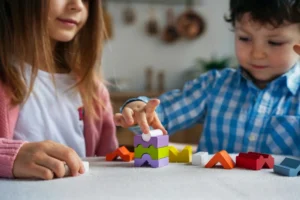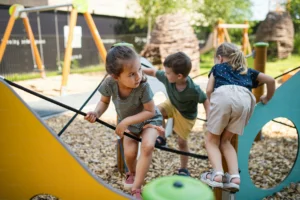It’s no secret that kids today are spending less time outdoors than ever before. Parks and playgrounds are quieter, while screens glow brighter in living rooms and classrooms alike. Research shows the average child spends more than six hours a day on gadgets, but less than one hour outside. For parents and educators, this raises an important question: what...
How Play-Based Learning Shapes a Child’s Overall Development
Childhood is often called the most crucial stage of life—and play is at the heart of it. While some may think of play as “just fun,” educators and child development experts agree that it’s far more than that. Play-based learning is an evidence-backed approach that combines joy, exploration, and creativity with education. It nurtures not only academic skills but also the holistic development of a child, covering physical, cognitive, social, and emotional growth. In this blog, we’ll explore why play-based learning is considered essential in early childhood education and how it shapes a child’s overall development for life.
The Concept of Play-Based Learning
What Is Play-Based Learning?
Play-based learning is an educational approach that integrates purposeful play with learning objectives. It allows children to explore, experiment, and make sense of the world around them while developing essential skills.
Core principles include:
- Children learn best through active engagement and exploration.
- Play fosters curiosity, imagination, and problem-solving.
- Learning is child-centered, with adults acting as guides, not dictators.
Traditional Learning vs. Play-Based Learning
Traditional learning often emphasizes memorization, worksheets, and teacher-led instruction.
Play-based learning focuses on hands-on activities, imagination, and guided discovery where children actively participate in shaping their learning experiences.
Examples of Play-Based Activities
- Structured play: puzzles, board games, role-play with clear objectives.
- Unstructured play: outdoor free play, building with blocks, pretend play with dolls or kitchen sets.
Both types are crucial, offering a balance between guided skill development and self-expression.
👉 Try these fun indoor activities for kids on a rainy day to encourage structured and unstructured play at home.
Cognitive Development Through Play
Play is a powerful tool for shaping a child’s brain development and intellectual growth.
- Problem-Solving Skills: Games like puzzles, building blocks, or strategy-based board games help children learn cause-and-effect, planning, and decision-making.
- Language and Communication: Pretend play scenarios (like running a “shop” or storytelling games) expand vocabulary, improve sentence formation, and strengthen listening skills.
- Creativity and Imagination: Open-ended play—drawing, pretend adventures, or Lego building—encourages innovative thinking. See how creativity in kids can be nurtured effectively.
According to the American Academy of Pediatrics, play is essential for healthy brain development as it strengthens memory, critical thinking, and executive functioning.

Social & Emotional Development Through Play
Play is where children first learn how to interact with others and manage their emotions.
- Empathy and Teamwork: Group play teaches children to share, take turns, and understand the feelings of others. Explore these social skills games for children to build cooperation.
- Self-Regulation and Resilience: Losing a game or waiting for a turn builds patience and the ability to cope with disappointment.
- Emotional Expression: Role-play activities (like pretending to be doctors, teachers, or superheroes) give children safe spaces to express emotions. For more, read about the importance of empathy in child development.
These experiences shape emotional intelligence, which is often a stronger predictor of success in adulthood than IQ.
Physical Development & Motor Skills
- Gross Motor Skills: Outdoor play like running, climbing, and cycling develops strength, balance, and coordination.
- Fine Motor Skills: Activities such as coloring, threading beads, or stacking blocks refine hand-eye coordination and dexterity—skills that prepare children for writing and self-care tasks.
- Physical Activity and Health: Play encourages children to move, stay active, and release energy. Discover why fine motor skills are declining in kids due to screens.

Academic Readiness and Lifelong Learning
One of the biggest misconceptions is that play distracts from academics. In reality, play enhances school readiness.
- Numeracy Skills: Counting toys, building towers, or playing shop helps children understand numbers, shapes, and patterns.
- Literacy Skills: Storytelling, role play, and rhyming games develop vocabulary and comprehension. Check the benefits of storytelling for preschoolers.
- Focus and Curiosity: Play makes learning fun, which naturally boosts attention span, problem-solving ability, and independent thinking.
A Cambridge University study found that children in play-rich environments showed higher levels of curiosity and engagement compared to those in rigid academic settings.
The Role of Parents and Educators
How Parents Can Encourage Play
- Provide open-ended toys like blocks, dolls, and art supplies.
- Limit screen time and encourage outdoor play.
- Join children in play to build bonds while modeling positive behavior.
The Role of Teachers
- Create structured yet flexible classroom activities.
- Integrate play into lesson plans—math through counting games, science through experiments, language through storytelling.
- Guide while allowing autonomy.
Striking a Balance
The most effective environment combines free play and guided play—giving children space to explore while ensuring learning goals are met.
Long-Term Benefits of Play-Based Learning
- Holistic Growth: Children develop cognitive, emotional, physical, and social skills in harmony.
- Real-World Readiness: Play-based learners often excel at collaboration, adaptability, and critical thinking.
- Emotional Intelligence: Managing emotions during play builds resilience that benefits them well into adulthood.
- Confidence and Self-Esteem: Success in creative and social play fosters independence and belief in one’s abilities.
Conclusion: Play Is Not Just Fun, It’s Fundamental
The evidence is clear: play is not a distraction from learning—it is learning. Through play-based learning, children develop essential life skills while building academic readiness and emotional intelligence. It supports the holistic development of a child, preparing them not just for school but for life.
👉 Whether you’re a parent or educator, encourage play daily—because every block stacked, story told, or game played is shaping the future of a confident, resilient, and well-rounded individual.

